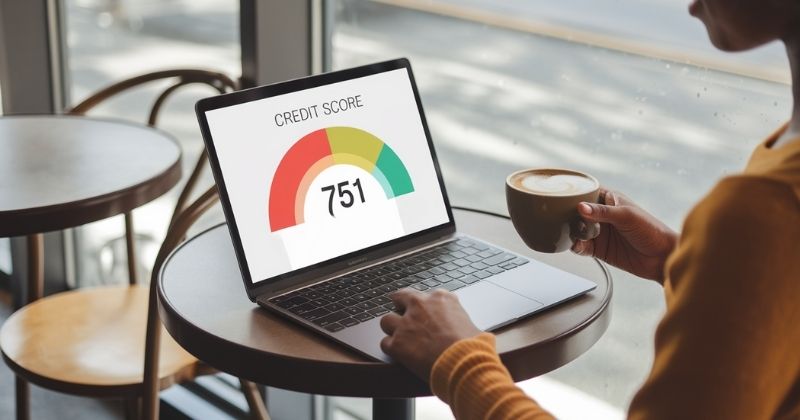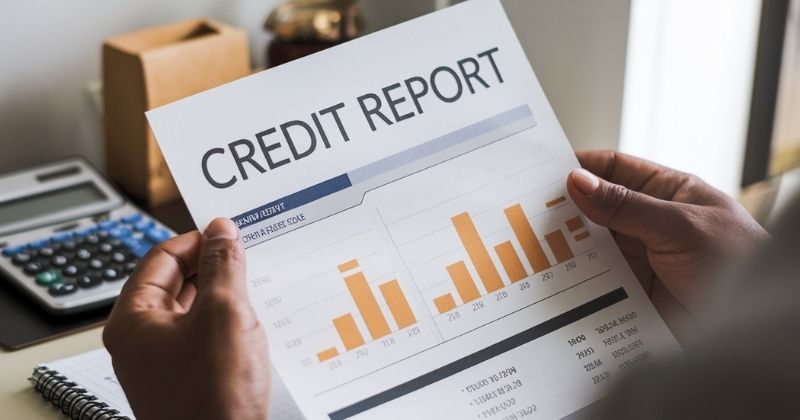
When considering a personal loan, understanding your credit score’s impact on eligibility and loan terms is crucial. Personal loans can provide quick access to funds for a variety of needs, from debt consolidation to emergency expenses, but lenders rely heavily on credit scores to determine how much risk they’re taking on. While some lenders may approve applicants with lower scores, these loans often come with higher interest rates and stricter repayment terms. So, what exactly is the minimum credit score needed to secure a personal loan?
Key Takeaways
- Regularly Check Your Credit Report: Reviewing your credit report for errors is essential, as inaccuracies can hurt your score. In South Africa, you can access one free credit report per year from each credit bureau.
- Factors Impacting Credit Score: Your credit score is influenced by factors such as repayment history, employment stability, current debt levels, credit applications, and account age. Lenders use these criteria to assess your financial risk and determine loan eligibility.
- Improving Credit Score: Maintaining consistent payments, limiting credit usage, and keeping debt levels manageable can help improve your credit score, thereby enhancing the likelihood of loan approval and securing better terms.
Understanding Credit Scores
Credit scores are crucial in assessing your creditworthiness and play a significant role in your financial profile. In South Africa, credit scores are compiled by credit bureaus like Experian, TransUnion, and Compuscan, using data from your borrowing and repayment history. Scores typically range from 0 to 999, with higher scores indicating a stronger credit profile. But how exactly does this number impact your ability to secure a personal loan?
How Credit Scores Impact Personal Loan Approval
Lenders assess your credit score to gauge the risk of lending you money. A higher credit score not only increases your chances of loan approval but also ensures more favourable loan terms, such as lower interest rates and flexible repayment plans. Conversely, a low credit score may result in higher interest rates, or even loan rejection. In South Africa, the difference between a good and bad credit score is significant, often determining the cost of borrowing and the options available to you.
The Minimum Credit Score for a Personal Loan in South Africa
While there is no universal minimum credit score for personal loans, most lenders in South Africa require a score of at least 600 to consider your application. Some banks may set higher thresholds, while credit unions and alternative lenders might be more lenient. It’s important to note that your credit score isn’t the only factor lenders consider; income, employment stability, and existing debts also play a role in the approval process.
Your credit score matters, but what about your bank account status? Read our guide: Can You Get a Loan Without Bank Account? for a deeper understanding.
About Arcadia Finance
Get hassle-free loans with Arcadia Finance. Choose from 19 trusted lenders, no application fees, and complete compliance with South Africa’s National Credit Regulator. Simple, secure, and tailored to your needs.

Factors That Influence Your Credit Score
Credit bureaus determine your credit score by conducting a risk analysis that evaluates various elements of your financial history. Each bureau has a unique method for calculating this score, which contributes to the details within your credit report. While your credit score is an essential part of this report, it is not the only component. Your report also includes a comprehensive summary of your financial background, an outline of your account history, and an assessment of your financial profile and rating.
The calculation of a credit score relies on several factors that collectively provide insight into your financial risk level. Key elements influencing your score include:
Repayment History
This assesses whether you consistently meet your payment obligations on time. Instances of missed or late payments, even if infrequent, can negatively impact your score.
Employment Background and Financial Stability
Your job history and current financial situation are taken into account, reflecting your reliability and financial capacity. Stable employment can enhance your score.
Current Debt and Available Credit
The amount of outstanding debt you carry in relation to your available credit is crucial. High levels of debt compared to your credit limits may lower your score.
Credit Applications
The types of credit you have applied for and the frequency of these applications are evaluated. Frequent applications can suggest financial instability and may adversely affect your score.
Account Age
The length of time your accounts have been active is considered, with longer account histories typically viewed as a positive factor. This indicates experience in managing credit.
Legal Judgments
Any court rulings against you, such as blacklisting, are recorded, indicating potential credit risk and negatively impacting your score.
Your credit score can be affected by everyday credit card habits that can hurt your credit score—habits you might easily overlook. From missing payments to maxing out your limit, these behaviors could haunt you when seeking personal loans.
Credit Score Ranges and Their Risk Levels
Your credit score, which ranges from 0 to 999, is an assessment of your financial habits and the likelihood of repaying future loans. This score reflects your creditworthiness, which lenders evaluate when considering loan approvals. While individual circumstances vary, here’s a breakdown of credit score categories and the associated level of risk:
| Credit Score Range | Category | Description |
|---|---|---|
| 767 – 999 | Excellent Credit | Very low risk; highly favourable to lenders. |
| 681 – 766 | Good Credit | Likely to be approved for a loan. |
| 614 – 680 | Medium Risk | Moderate risk; may face challenges securing a loan. |
| 583 – 613 | Higher Risk | Potential high risk; lenders may view this cautiously. |
| Below 583 | High Risk | High risk; unlikely to secure loan approval. |
Discover the ultimate ways to check your credit score for free and empower yourself with financial transparency!
Why Might Your Credit Score Be Lower Than Anticipated?
Even if you diligently repay your debts and strive to maintain low debt levels, you might still discover that your credit score is not as favourable as you expected. Here are several potential reasons for this:
- High Available Credit: Having a large amount of available credit, even if unused, can raise concerns for lenders. They may view this as a risk for rapid debt accumulation if you decide to use all available credit at once.
- Short Credit History: If your credit history is relatively short, especially if it’s less than six years, there may not be enough data to establish a comprehensive credit score. This can make you appear as a higher-risk borrower.
- Limited Credit Accounts: A limited number of credit accounts in your name can also negatively impact your score. Lenders may struggle to assess your creditworthiness with an insufficient credit history.
- Missed or Late Payments: Unexpected missed or late payments can affect your credit score, as these are indicators of potential issues with payment reliability.
- High Balances Relative to Credit Limits: Balances that are close to your credit limits can suggest a reliance on credit for daily expenses. This may raise concerns for lenders regarding your financial stability.

How to Improve Your Credit Score Before Applying for a Loan
- Make Timely Payments in Full: Aim to pay all your accounts on time and, whenever possible, settle the full amount due. Paying only the minimum on debts may hinder significant progress in reducing outstanding balances.
- Limit Credit Usage to Essentials: Use credit wisely, applying it only when necessary, and avoid approaching your credit limits. Staying well below these limits helps maintain a healthier credit profile.
- Minimise Credit Card Balances: Strive to keep credit card debt as low as possible. Credit cards often carry higher interest rates, making it difficult to manage balances effectively over time.
- Keep Debt Within Reasonable Limits: Aim to keep your total debt obligations below 30% of your monthly income. High debt relative to income can adversely affect your credit score and repayment capacity.
- Seek Alternative Arrangements If Needed: If you find it challenging to meet repayment requirements, consider contacting your lenders to discuss alternative arrangements. Addressing repayment challenges early can help prevent negative impacts on your credit.
Preparing your credit score in advance of applying for a personal loan can enhance your chances of approval. Consistently maintaining good payment habits and using credit responsibly may help you achieve a score above 600, increasing the likelihood of qualifying for loan terms that meet your needs.
How Long Does it Take for an Improved Credit Score to Show?
The timeframe for seeing changes in your credit score can vary significantly based on your specific starting point and the areas of your credit history that require improvement. While individual circumstances play a role, if you diligently implement the suggested steps and consistently work on your credit, you should notice gradual progress in your score after approximately three months.
Minor events in your credit history typically remain visible for about two years and have a limited impact on your score. However, it’s important to note that more significant occurrences can remain on record for up to 10 years. Factors such as late payments, legal actions, and bankruptcy filings can have a more substantial effect on your credit score during this time.
Where Can You Access Your Credit Score?
Under South African law, every citizen is entitled to receive one free credit score report each year from any of the recognised credit bureaus, which include TransUnion, Compuscan, Experian, and XDS. For individuals interested in monitoring their credit score more frequently, additional credit reports can be requested throughout the year for a small fee. This service can be particularly beneficial for those actively working to improve their score or wishing to keep a closer eye on their financial status. To obtain further reports, simply request them from one of these credit bureaus and make the necessary payment.
| Credit Bureau | Annual Free Credit Report | Score | Additional Report Fees | Online Access | Extra Services |
|---|---|---|---|---|---|
| TransUnion | Yes, 1 free report per year | 0 – 999 | Varies, typically around R25-R50 | Yes | Offers credit monitoring, fraud protection, and debt analysis |
| Experian | Yes, 1 free report per year | 0 – 999 | Varies, around R20-R40 | Yes | Provides identity theft protection, credit advice, and detailed credit report analysis |
| Compuscan | Yes, 1 free report per year | 0 – 999 | R25 per additional report | Yes | Offers credit education, debt counselling services, and risk assessments |
| XDS | Yes, 1 free report per year | 0 – 999 | Typically R25-R50 per report | Yes | Includes financial literacy resources, credit education, and debt monitoring options |
Conclusion
Understanding and managing your credit score is essential for South Africans seeking loan approvals. A strong credit score, ideally above 670, not only enhances the likelihood of approval but can also result in more favourable loan terms. Key actions such as making timely repayments, using credit responsibly, and keeping debt within reasonable limits can help improve and maintain your score. By actively managing these factors and regularly checking your credit score through a recognised credit bureau, you can work towards financial stability and increased borrowing opportunities.
Frequently Asked Questions
Most lenders in South Africa prefer a credit score of at least 600 for personal loan applications. While a higher score increases your chances of approval and access to better interest rates, some lenders may still consider applicants with lower scores, depending on other factors such as income and debt levels.
Yes, it is possible, though it may be more challenging. Some lenders might approve loans for applicants with lower scores, but this often comes with higher interest rates. Improving your credit score before applying can help you secure better loan terms.
To improve your credit score, focus on making timely repayments, limiting your credit usage, paying down existing debts, and avoiding frequent new credit applications. Regularly monitoring your credit score can also help you track progress and address any issues.
It is advisable to check your credit score at least three to six months before applying for a personal loan. This allows you time to make any necessary improvements. In South Africa, citizens are entitled to one free credit score check per year from a credit bureau.
Yes, frequent applications for credit can negatively impact your score, as they signal potential financial stress or reliance on credit. It’s best to apply for a personal loan only when you are prepared and likely to qualify.
Fast, uncomplicated, and trustworthy loan comparisons
At Arcadia Finance, you can compare loan offers from multiple lenders with no obligation and free of charge. Get a clear overview of your options and choose the best deal for you.
Fill out our form today to easily compare interest rates from 19 banks and find the right loan for you.




